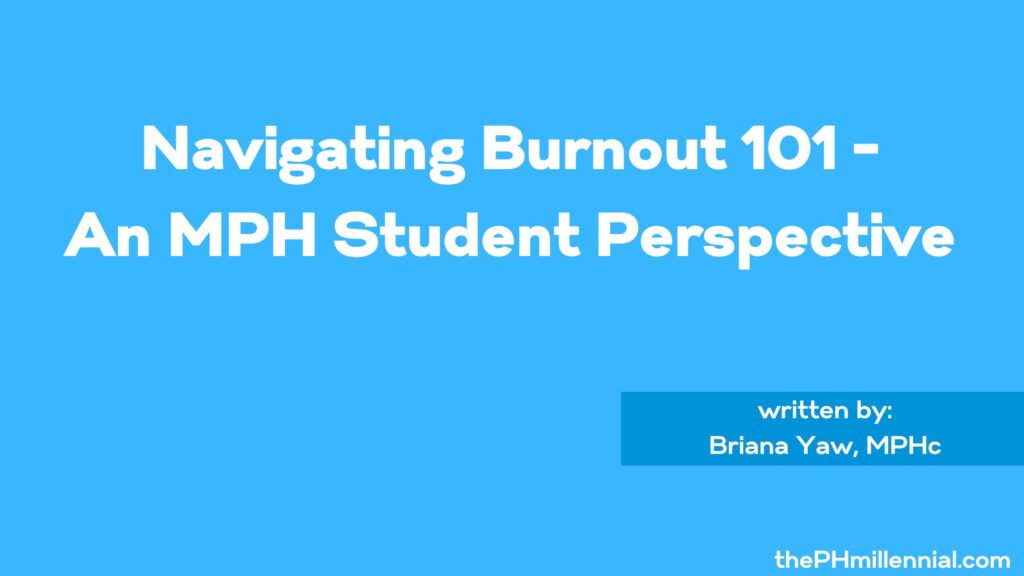Introduction
As a public health student or professional, have you ever felt so passionate about achieving your dreams but burnout often was the barrier keeping you from seeking out your fullest potential?
Well if you can relate this article is for you.
My Story
My name is Briana Yaw, Intern at The Public Health Millennial. I am an MPH student at Montclair State University in the concentration of Community Health Education. I also work as an Oncology Pharmacy Technician.
Fulfilling the roles and responsibilities of a student, intern, and full-time employee made maintaining my mental well-being difficult. My MPH student journey, while honorable, posed challenges in managing my mental health and work-life balance.
Growing up as a child I was often labeled the black sheep when compared to my peers. For a long time, I gauged my self-worth and identity more on external opinions than my own, leading to a sense of low self-esteem and identity loss. Patterns I believed played a major role in my struggle with managing my mental health was the self-doubt, low self-esteem, and people pleasing tendencies that I so often subjected myself to.
Years of experiencing negative outcomes that aligned with these factors finally prompted me to take action toward positive change. This shift in mindset has led me to living a lifestyle that prioritizes self-encouragement and the integration of positive habits into my daily routine.
Crucial acts that I incorporated into my daily routine include self love, showing myself grace, and prioritizing self-care. This allowed me to successfully manage my tasks and responsibilities all while meeting my educational and professional goals.
In this article, we will explore the various impacts of a MPH student’s mental health and discuss potential strategies for addressing these challenges.
Mental Health as an MPH Student
The mental health challenges faced by students can hamper their ability to excel in everyday life. As a student pursuing an MPH, the impacts of mental health cannot be underestimated.
It is not uncommon for MPH students to face immense pressure, endless deadlines, and high expectations. While mental health affects individuals from various backgrounds, the unique challenges faced by MPH students can significantly impact their well being and ability to excel.
Students learn about health inequities, health disparities, disease outbreaks, poverty, and stories from marginalized communities. This can lead to feelings of being overwhelmed by the magnitude of the topics they face and the pressure of feeling like this is partially their responsibility to fix.
Some examples of mental health impacts for MPH students include:
- Impaired academic performance
- Stress
- Burnout
- Anxiety
- Depression
- Lower cognitive function
- Procrastination
Feelings of depression or anxiety can negatively impact concentration, memory and cognitive functioning. This can make it challenging for students to retain information, stay focused during lectures, do their best on assignments, and perform well on exams. As a result their grades may suffer. Which further contributes to feelings of stress and self-doubt.
One of the most significant impacts of mental health on MPH students is the increased risk of burnout. Burnout is a state of chronic physical and emotional exhaustion that results from excessive and long-term stress. MPH students are often juggling multiple responsibilities, including coursework, research projects, internships, and full-time jobs.
MPH students are under constant pressure
School as an MPH student is not only tough academically, but also carries the burden of facing health inequities daily through coursework and discussions. The constant pressure of doing well academically, working at internships/jobs, and navigating tough topics is a lot to deal with.
Moreover, the nature of the public health field itself can contribute to the challenges faced by MPH students. Public health professionals are often exposed to the hardships and suffering of individuals and communities, which can take a toll on their mental well being.
This constant pressure can lead to feelings of:
- Being overwhelmed
- Fatigue
- Survival mode/chronic stress
The demands of the program can leave little time for self-care and socializing, limit time and energy available for meaningful connections, and a reduction of work-life balance. These demands can result in feelings of isolation, loneliness, and strain relationships.
What Can Be Done
Recognizing and addressing the impacts of mental health for MPH students is crucial for both their personal well being and their potential as future public health professionals.
The first step is destigmatizing mental health issues and creating a supportive and inclusive environment within MPH programs. This can be achieved through increased awareness and education about mental health, as well as the provision of resources such as counseling services and mental health workshops.
For example, utilizing the counseling services at school or through your job as an effort to expand your support system. Another example could be seeking out a mentor familiar to the career field to pass on their knowledge and experiences overcoming adversities throughout their journey.
Additionally, it is essential for MPH students to practice self-care and prioritize their mental well being.
This can include engaging in activities such as:
- Exercise
- Mindfulness
- Restorative and relaxing hobbies
- Self-reflection
Setting boundaries and establishing realistic expectations for oneself can also help prevent burnout and promote overall mental wellness. Furthermore, fostering a sense of community and support among MPH students can be instrumental in navigating the challenges of mental health.
Encouraging peer support groups, mentorship programs, and networking opportunities within the program can help students feel connected and supported throughout their journey.
Conclusion
In conclusion, mental health has a profound impact on MPH students.
From the risk of burnout to impaired academic performance and strained relationships, the challenges faced by MPH students are real and significant. However, by recognizing and addressing these impacts through destigmatization, self-care, and community support, we can ensure that MPH students not only thrive personally but also become effective and compassionate public health professionals.



